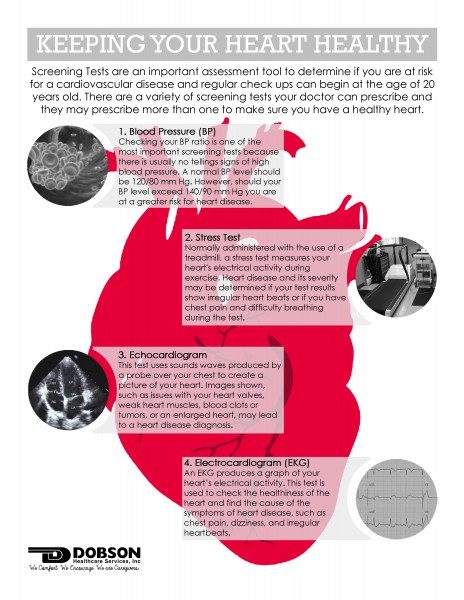According to the National Heart, Lung, and Blood Institute, a diagnosis of a cardiovascular disease is “…based on your medical and family histories, your risk factors, a physical exam, and the results from tests and procedures” (National Heart, Lung, and Blood Institute, 2014). Below you will find a brief explanation of a few of these screening tests. If you feel you are at risk for heart disease, we encourage you to talk to your doctor about these tests, his or her recommendation for you, and what the results of the test(s) will mean.
American Heart Association. (2014, October 21). Heart-Health Screenings. Retrieved February 18, 2016.
American Heart Association. (2015). What is a Stress Test? Retrieved February 18, 2016.
National Heart, Lung, and Blood Institute. (2012, February 29). The Heart Truth® for Women: If You Have Heart Disease. Retrieved February 18, 2016.
National Heart, Lung, and Blood Institute. (2014, April 21). How Is Heart Disease Diagnosed? Retrieved February 18, 2016.
National Heart, Lung, and Blood Institute. (2011, October 31). What Does Echocardiography Show? Retrieved February 18, 2016.
WebMD. (2014, August 13). Heart Tests: When Do You Need Them? Retrieved February 18, 2016.
WebMD. (2014, September 26). What Is an Electrocardiogram (EKG or ECG) Test? Retrieved February 18, 2016.
Photo: Blood Clotting Nemesis of Life. (n.d.). Retrieved February 18, 2016.
Photo: Gwinnett Clinic. (n.d.). Cardiac Testing. Retrieved February 18, 2016.
Photo: Echocardiographer.org. (n.d.). Transthoracic Echo. Retrieved February 18, 2016.
Photo: ECG Wave-Maven. (2015, June 6). Diagnostic Cardiac Catheterization and Coronary Angiography. Retrieved February 18, 2016

